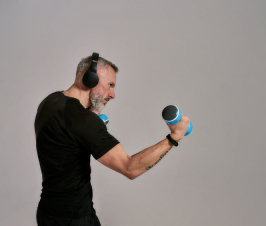Dr. Richard Maurer, ND
@DrRichardMaurer
Does pounding protein at bedtime help build muscle? In this study of 44 young, recreationally active men, aged 21-23, muscle mass and power improved with a protein drink before bedtime compared to a placebo group. Done! If you want more strength and a more muscular body drink that 27-gram protein beverage before bed. But first, let’s see what else these young men did to pump it up.
The workout: Realize both groups, the protein and placebo group, gained in leanness and strength throughout the 12 weeks The protein group simply gained more of both power and mass. All participated in a supervised strength-training regimen—three times weekly the men performed a 5-minute warm up and warm down around a vigorous resistance-based program. The exercises covered all major muscle groups and were limited to what is called 80% of 1 repetition max (RM). This means that 8-10 repetitions of a given exercise is the absolute maximum tolerable. Interestingly, this is the strenuous guideline I emphasize in The Blood Code Fitness Principles [The Blood Code: Unlock the secrets of your metabolism, 2014] to reverse insulin resistance at any age. But in this study, once the 22 year-old could do the exercise 11 times—the weight was increased to 80% of 1RM. This was a hard workout, and got harder as strength increased.
The protein intake: Both groups averaged 1.3 grams/kg of body weight. So a 155-pound man (70 kg) averaged 90 grams of protein in their three daily meals. The protein-supplemented group received 27 grams of a casein protein drink at bedtime—increasing the total protein intake for the day by 30%.
I want to emphasize a couple things that are well-understood long-before this study—body building is best accomplished when resistance is increased with tolerance. Many exercisers, myself included, are interested in maintenance of fitness and tend to keep the weight and resistance similar from workout to workout over years. This type of exercise does not send the message to make bigger muscles. Second, when using a strenuous workout to build muscle mass, body-builders know that higher protein intake works better than moderate to low protein intakes. Did the researchers simply show us that daily protein intake of 1.7 g/kg (119 g of protein for a 155-pound man) works better than 1.3 g/kg (91 g of protein for a 155-pound man) when engaging in a strenuous body building workout program—regardless of timing in the day?
Years ago, I explained the importance of the 30-60 minute window post-workout for my athletic clients. In recent years, research has opened the “recovery window” wide—additional protein intake doesn’t need be within one hour of your workout, it can be any time later that day. The researchers in this study show me that even bedtime fits into the recovery window to help build strength and muscle mass with resistance training.
 Dr. Richard Maurer is a licensed naturopathic physician who, after practicing in a primary care setting for twenty years, provides a fresh and radical perspective on metabolic health and recovery from disease. Rather than provide yet another medical opinion, Dr. Maurer puts you in the driver’s seat of your health and wellness, helping you decode your blood test results to find the diet and fitness habits that reverse and prevent metabolic conditions, such as prediabetes and type 2 diabetes, weight gain and hypothyroid problems.
Dr. Richard Maurer is a licensed naturopathic physician who, after practicing in a primary care setting for twenty years, provides a fresh and radical perspective on metabolic health and recovery from disease. Rather than provide yet another medical opinion, Dr. Maurer puts you in the driver’s seat of your health and wellness, helping you decode your blood test results to find the diet and fitness habits that reverse and prevent metabolic conditions, such as prediabetes and type 2 diabetes, weight gain and hypothyroid problems.
His recent book, The Blood Code: Unlock the secrets of your metabolism [2014], provides the tools for you to understand and act on key blood tests and skin fold measurements to define your personalized diet, fitness and nutritional needs. Dr. Maurer’s individualized metabolic approach is for teenagers to any age adult—with a goal toward recovering health and vitality, disease reversal is the beginning.
His personal and familial trend toward type 2 diabetes motivates him to empower people to recover their metabolic “sweet spot” through proven self-guided diet, nutritional, and fitness habits.
Dr. Maurer is the past president of the Maine Association of Naturopathic Doctors and most recently presented for the Weston Price Foundation, American Association of Naturopathic Physicians and the popular PaleoF(x) Conference. He lives in Maine with his wife Alexandra where they have raised three children.
Reference:
Journal of Nutrition. Protein Ingestion before Sleep Increases Muscle Mass and Strength Gains during Prolonged Resistance-Type Exercise Training in Healthy Young Men. Available at: http://jn.nutrition.org/content/early/2015/04/29/jn.114.208371.abstract. Accessed July 14, 2015.

















